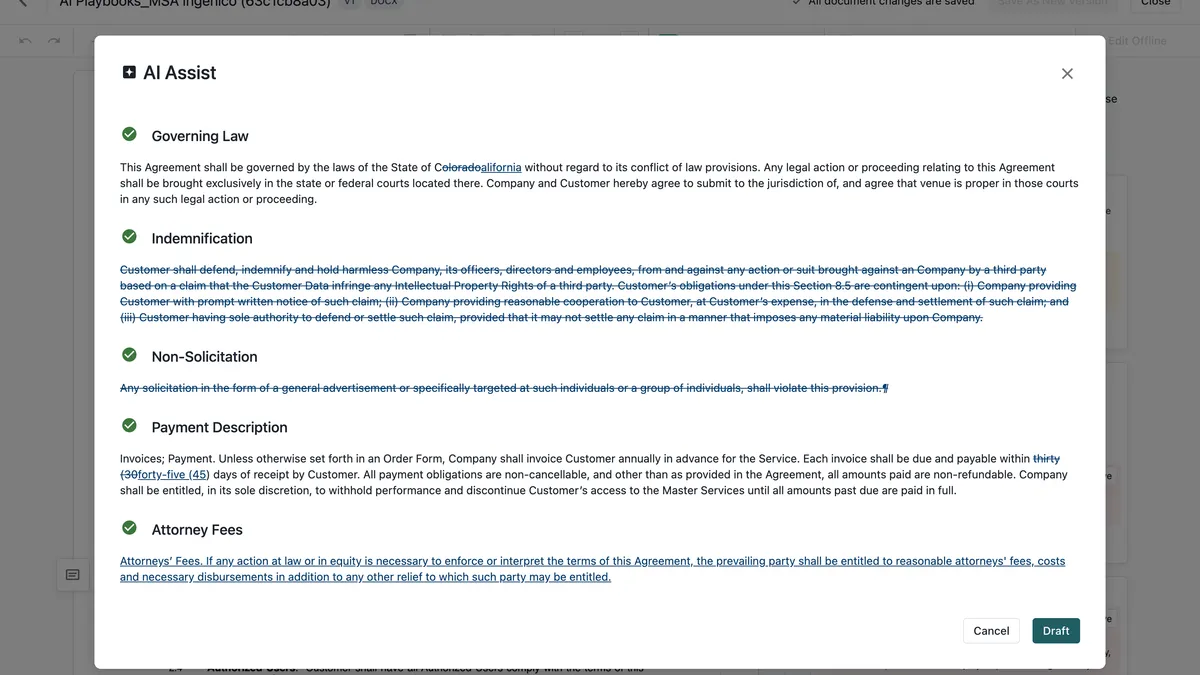The contract lifecycle management provider Ironclad released an AI Playbooks functionality last year that alerts users to language that is missing in an agreement or clauses that should not be present.
The technology then suggests alternative language that could be added or negotiated into the contract based on a legal department’s guidelines.
Cai GoGwilt, Ironclad’s co-founder and CTO, said the feedback from beta users of the tool was quite positive. However, some customers said the playbooks feature would make their lives even easier if they could implement the technology’s redline suggestions without having to do it manually.
Ironclad wasn’t sure at first that could be done just yet, GoGwilt said, but the CLM company later realized that the AI language model known as GPT-3 provided a pathway. The generative artificial intelligence technology, which was developed by OpenAI, has recently gained widespread attention for powering the ChatGPT chatbot.
After testing GPT-3 internally for several months and working with OpenAI, Ironclad recently released its AI Assist feature that instantly generates redlines that can be accepted or rejected with a single click.
“With AI Assist, we're taking the issues that have been identified in the contract by AI Playbooks and taking a first pass at changing them to be appropriate,” GoGwilt said. “By doing that, we're helping legal teams speed up contract review.”
Use cases
GoGwilt gave some examples of how Ironclad’s AI Assist can be used by legal teams and other business users in a demonstration video featuring an agreement with a new vendor.
Ironclad AI identified five contractual issues, including a non-standard Colorado governing law jurisdiction and a missing attorney fees provision.

If a user then clicked the AI Assist button, it would change the governing law to California and insert pre-approved standard attorney fees language.
“The five issues that Ironclad AI had identified from the playbook have now been all resolved,” GoGwilt said.
These updates would show up as track changes so it is easy for the counterparty to see the revisions.
Additionally, lawyers can use the open-ended prompt feature to receive suggestions for updating clauses that have not been encoded in a playbook, such as a confidentiality clause.
Overall, GoGwilt said, AI Assist has the potential to save in-house lawyers hours of manual contract review, while also ensuring greater consistency and fewer mistakes in contracting.
“As an expert attorney, you may be able to review one master service agreement better than anything on the planet,” he said. “But if you're asked to do that 100 times in a single day, you're going to start missing things. The AI doesn't get tired.”
Tech adoption
Legal industry veteran Mary O’Carroll, who serves as Ironclad’s chief community officer, said technology such as AI Assist is a big step up from legal tools in the past that were often clunky, difficult-to-use and did not add clear value to the lawyer’s experience.
As a result of recent technological advances, she expects to see Ironclad’s AI-powered contracting software gain greater traction among in-house legal teams while facing less resistance to implementation.

“We're finally at the point where the technology that we're bringing to legal departments is transformative, is better than the old way and they're immediately able to see the value of trying a new way of doing things,” O’Carroll told Legal Dive.
O’Carroll, who previously worked as Google’s director of legal operations, said another reason she anticipates AI Assist making quick inroads is that it will allow lawyers to spend more time on higher-value work and strategic planning.
Additionally, she said, attorneys should not fear that implementing the innovative technology will reduce the need for them at companies.
“This is not really eliminating any part of the lawyer's job except for the stuff that is routine and probably shouldn't be where they should be focusing their time,” O’Carroll said. “We're just helping that piece of their day go faster, and this allows them to then step back and actually do the part of the job that adds value to their organization.”
Collaborating with OpenAI
One of the beta users of AI Assist is OpenAI, which was an Ironclad customer long before the new release.
GoGwilt said it’s been great working with the research lab, including its legal team, to help advance Ironclad’s use of artificial intelligence.
“When it comes to innovation, there are few companies closer to the bleeding edge than OpenAI,” GoGwilt said. “And who better to understand the potential impact this technology can deliver for legal teams than OpenAI’s own legal team.”
Jason Kwon, OpenAI’s general counsel, offered praise for the collaboration as well.
“Contracting is a notoriously manual and labor intensive process – a perfect example of where AI can help push an industry forward,” Kwon said in a prepared statement. “As both partners and users of Ironclad, we see their technology and leadership as incredibly impactful for both businesses and the humans driving them.”
GoGwilt said Ironclad plans to keep working with OpenAI and soliciting feedback from other beta users to help guide its further use of generative artificial intelligence in digital contracting.
“I think 12 months from now, we'll look back on this year and think like 2023 was the year that AI changed the face of contracting and changed the face of legal,” GoGwilt said. “We definitely plan to be at the forefront and a big part of that change.”


















